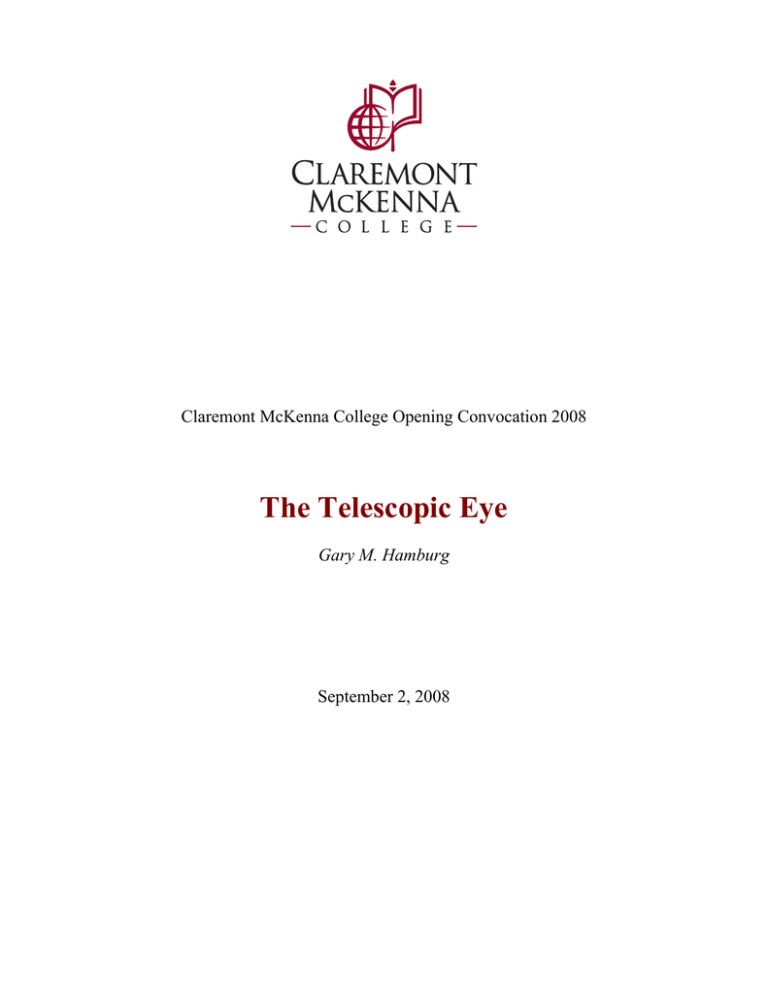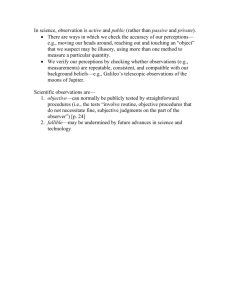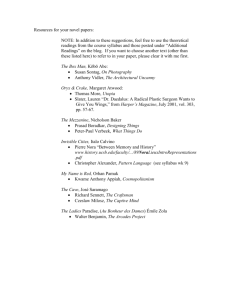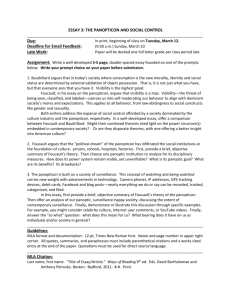The Telescopic Eye Claremont McKenna College Opening Convocation 2008 September 2, 2008
advertisement

Claremont McKenna College Opening Convocation 2008 The Telescopic Eye Gary M. Hamburg September 2, 2008 1 The Telescopic Eye: Convocation Address, 2 September 2008 I Over my life as a bibliophile, I have read thousands of dull monographs, dozens of brilliant treatises, some tens of brilliant novels, hundreds of splendid poems, and several memorable speeches by an American president. Sometimes, in the thicket of prose or verse, I have spied an odd passage, the kind that looks by its mimicry to belong organically to the thicket but that suddenly takes off, forcing me to chase after it, like one of the rare butterflies that the lepidopterist/novelist Vladimir Nabokov loved to collect, kill and mount for his collection. At the beginning of this convocation speech, please permit me to display before you three of my precious butterfly ideas, each belonging to a species illuminating how we human beings perceive, understand and attempt to control the world. The first of these exotic passages comes from the pen of the sly, erudite, half-mad Argentine writer Jorge Luis Borges. In a short story of 1949 called “The Aleph,” Borges imagined a basement stairway in an old house in Buenos Aires, where on the nineteenth step his narrator observed a mysterious vision, a small bright light in which “all the places in the world, seen from every angle, coexist.” Borges’ narrator described this light as a “dizzying spectacle” because, “although it was only two or three centimeters in diameter, it contained every point in the cosmos.” In it, he reported, “I saw the populous sea, saw dawn and dusk, saw the multitudes of the Americas, saw a silvery spider at the back of a black pyramid, saw a broken labyrinth (it was London), saw endless eyes all very close, studying me as though in a mirror, saw all the mirrors on the planet (and none of them reflecting me), saw in a rear courtyard on Calle Soyer the same tiles I’d seen twenty years before in the entryway of a house in Fray Bentos, saw clusters of grapes, snow, tobacco, veins of metal ore, water vapor, saw convex equatorial deserts and their every grain of sand, saw a woman in Inverness whom I shall never forget…” “I saw the earth in the Aleph, and the Aleph in the earth, saw my face and my viscera, saw your face and I felt dizzy, and I wept because my eyes had seen that secret, hypothetical object whose name has been usurped by men but which no man has every truly looked upon: the inconceivable universe.” This astonishing vision moved the narrator first to “infinite veneration, to infinite pity,” but ultimately to irritation and to a belief that the vision was a “false Aleph.”1 1 Jorge Luis Borges, “The Aleph,” in Collected Fictions, translated by Andrew Hurley (New York and London: Viking, 1998) pp. 274 - 286, here 283 – 284. 2 Before commenting on this strange passage, let me offer you a second one, taken from a book by the supremely intelligent, supremely egotistical French anarchist philosopher Michel Foucault in his 1975 book Surveiller et punir. Naissance de la prison, a book misleadingly translated into English under the title Discipline and Punish. The Birth of the Prison. In a chapter called “Le panoptisme”, Foucault discussed a blueprint for a model prison developed by the British utilitarian Jeremy Bentham and called “The Panopticon.” The blueprint showed a tall windowed tower in the middle of a prison from which guards could observe what was happening in each prison cell on the prison’s periphery, but could watch prisoners without being observed themselves. Each prisoner would be locked in his own cell, and would endure every minute of the day knowing that he might just then be under the guards’ surreptitious gaze. Foucault’s commentary on Bentham’s model prison was that The Panopticon could be understood as a metaphor for the modern state, with its ambition to know everything about each solitary citizen, to keep each person under surveillance, while itself remaining mysterious and invisible to citizens. Foucault wrote: “It [The Panopticon] is an engine of power, which assures an asymmetry, a disequilibrium, a difference [between rulers and the ruled], making it of little importance who actually exercises power.”2 The third odd passage can be found in the 1968 autobiography of the Polish poet Czeslaw Milosz, a book ironically called Native Realm. In disclosing to readers how he had managed to survive, mind intact, the Russian Revolution, then a quarter century later, the destruction of Warsaw, Poland’s occupation by Nazi Germans and Soviets, then decades of exile in the West, Milosz referred to “a new organ, which we may call the telescopic eye, that perceives simultaneously not only different points of the globe but also different moments of time; the motion picture created it in all my contemporaries. And I, more than my contemporaries, had to make use of it, tossed as I was by circumstances from one civilization to another, from highpressure areas into low, and vice versa. From the Russian Revolution of 1917 seen through the eyes of a child and foreigner, to New Mexico and the coast of California, all the way to the old house on Lake Geneva, I have wandered through zones of storm and calm, heat and cold.”3 If we pause for a moment to think about these three passages, to dissect these intellectual butterflies, we might discover the following. Borges’ mysterious vision of the universe was a fictional approximation of God’s 2 Michel Foucault, Surveiller et punir. Naissance de la prison (Paris: Gallimard, 1975) p. 203. 3 Czeslaw Milosz, Native Realm, translated by Catherine S. Leach (Garden City, N.Y.: Doubleday, 1968). 3 vision of creation. Thus, Borges titled his story “The Aleph,” after the first letter of the Hebrew alphabet. Borges’ message was perhaps that, while human beings may aspire to know what God knows, that aspiration can never be fulfilled, no matter how close we seem to approach the Aleph. That is why the narrator finally described the “divine vision” of Garay Street as a “false Aleph.” Foucault’s Panopticon has seemed saner to many scholars, who have pointed out its empirical basis: in France and the United States real prisons were built on Bentham’s model; moreover, many modern states have been surveillance states, aiming to control citizens through spying and manipulation of information gathered from this espionage. Think here of the East German state depicted in the marvelous film The Lives of Others. But Foucault’s idea that all modern regimes resemble to one degree or another the engine of power in The Panopticon is paranoid fantasy. Milosz’s telescopic eye, however, is a metaphor for a real, useful, even indispensable human capacity: the ability to grasp events and cultures in different parts of the globe, to see their interrelatedness, and to grasp their implications. Put another way, developing a telescopic eye is, these days, an essential part of everyone’s education. II How might Milosz’s telescopic eye aid us to understand our current situation? Let me offer a set of random examples. We were amazed in August this year by the majesty of the opening ceremony of the Beijing Olympics, by the coordinated movements of hundreds of Chinese who made appear, in the middle of the “Bird’s Nest” stadium, the conji for “harmony.” The announcers on American television informed us that “harmony” is a central value of Chinese Confucianism and also the most important political goal of the Olympic movement. We needed Milosz’s telescopic eye to inform us that “harmony” enforced by the current Chinese government seems to entail silencing of human rights activists and other protestors, destroying any hope of Tibetan autonomy or independence, and continuing the long exile of the Dalai Lama from his ancestral home. One man’s “harmony” is another man’s prison term or bitter exile. Also in August we watched Russian armored units repelling an attack on South Ossetia, then invading neighboring Georgia, and capturing the mountain town Gori. The press informed us that the attack on South Ossetia originated in the Georgian President Mikhail Saakashvili’s impetuosity and concern to defend Georgian sovereignty; the Russian response was said to be linked to Prime Minister Vladimir Putin’s disdain for Saakashvili, and to his desire to re-exert Russian domination over its Near Abroad. We needed Milosz’s telescopic eye to inform us that in South Ossetia sits a nest of money launderers and mafiosi connected to powerful businessmen and politicians in 4 Moscow; that Gori sits close to a projected oil pipeline the Russians wish to control; that Gori is also the birthplace of the “Ossetian mountaineer” Iosif Dzhugashvili, better known as Joseph Stalin, the Soviet dictator whom Putin has admired as the greatest statesman of the twentieth century; and, of course, we needed the telescopic eye to remind us that John McCain’s declaration of solidarity with the Georgian people (“Today, we are all Georgians!”) was an attempt to echo President Kennedy’s 1963 declaration in front of the Berlin wall: “I am a Berliner.” (Milosz would have noted that Kennedy’s German phrase, “Ich bin ein Berliner,” was a funny error. Kennedy should have said: “Ich bin Berliner.” His actual sentence meant: “I am a sugary donut,” the “Berliner” being a pastry confection.) And just to stay with recent events, we are now witnessing the culmination of the presidential nominating process. The two major American parties have selected candidates who grew up not so much in the United States as abroad. John McCain, the rebellious child of a prominent military family, did not really appreciate his military heritage until he was imprisoned and tortured in Hanoi.4 Barack Obama was raised mostly outside the continental United States, in Hawaii and Indonesia. He was haunted throughout childhood by the absence of his father, an unsuccessful but charismatic Kenyan politician. Obama did not reach true adulthood until he had understood the legacy of this missing father.5 For us to assess the backgrounds of McCain and Obama requires a telescopic eye to bring into focus the Hanoi “Hilton”, the American military code of honor, Hawaiian, Indonesian and Kenyan culture, not to mention the nature of fatherhood. III How can one develop in oneself a telescopic eye – the capacity to understand the world in its political, religious, cultural and historical complexity? Perhaps you have made a big first step by enrolling yourself at this college. According to our registrar, more than eight percent of our degree-seeking students are international students. Demographic data on the faculty, indicate that between twenty and twenty-five percent of our instructors are either foreign-born or non-U.S. citizens. Such statistics suggest that one can learn a good deal about the international context in which we live by keeping open one’s eyes and ears to fellow students and faculty. Moreover, half of our junior class typically studies abroad for at least a semester. If you can, you should avail yourselves of that wonderful opportunity. 4 See the family biography and autobiography, John McCain, with Mark Salter, Faith of My Fathers (New York: Random House, 1999. 5 Barack Obama, Dreams from My Father. A Store of Race and Inheritance (New York: Times Books, 1995). 5 These data, however, underestimate our college’s commitment to international education. Every department in the humanities and social sciences offers courses relevant to international education. My own department (history) offers courses in Asian and Middle Eastern history, European history, Latin American history, and U.S. history framed in a global context. The government department hosts a popular interdisciplinary program in international relations. Philosophy, literature and modern languages, as well as religion, psychology (through its leadership sequence) and economics also deal with aspects of international relations. These intellectual resources are available to be tapped, but they can’t be accessed by osmosis. You must learn Arabic or Spanish, Korean or French, Russian or Chinese if you want to become an adept of one of those cultures. Acquiring another language is the best means to develop in one’s self the mode of vision Milosz has in mind. And you have to study religion, politics, culture and history of other countries if you wish to prepare yourself for the perils of the de-centered world order in which we already live. Mastering a technical discipline will not, by itself, suffice to perfect one’s telescopic eye. IV If you do what must be done in the classroom, you can be confident that your own telescopic eye will appear when you need it. Our college is a very good institution, standing in a long genealogy of colleges and universities dating back to the first schools of higher learning: Al-Azhar University in Cairo, founded in the tenth century, and the University of Paris, founded in the early thirteenth century. Al-Azhar, called in the Arabic Jami al-Qahirah or Al-Jami al-Azhar, was a large mosque school associated in its early days with Egypt’s Fatimid dynasty. From its beginning, Al-Azhar was open to students from other countries: in 988 the Caliph Al-Aziz built living quarters for thirty-five out of town students, most of whom came to study precepts of Islamic law. By the mid-eleventh century Al-Azhar was attracting students from Persia, like the remarkable Nasir-i-Khushraw.6 By the twentieth century, Al-Azhar housed nearly five thousand foreign students. The University of Paris, for its part, drew masters and students from all across Europe. Student life was even organized by language groups, by “nations” in the parlance of the day.7 Thus, international education has been a component of elite institutions since the very beginning of higher education. 6 See Bayard Dodge, Al-Azhar. A Millennium of Muslim Learning, Memorial Editiion (Washington, D.C.: The Middle East Institute, 1974) pp. 1 – 7, 18, 162 – 164. 7 On the origins of the University of Paris from the scattered “schools” of the city, see Stephen C. Ferruolo, The Origins of the University. The Schools of Paris and Their Critics, 1100 – 1215 (Stanford, Ca.: Stanford University Press, 1985). See also Gordon Leff, Paris and Oxford Universities in the Thirteenth and Fourteenth Centuries: An Institutional and 6 V The moral of this convocation address is that, as students and faculty, we should take advantage of our college’s international orientation to cultivate our inner resources. We should not embark on a misdirected effort to know the entire cosmos (that is God’s business), nor should we fall prey to Foucault’s error of supposing that individual citizens or the world can be wholly controlled by manipulating the knowledge gathered by governments or other agencies (human beings are too recalcitrant and the world too vast for that). We should do what we can to hone our awareness of other people’s histories and cultures, since our survival and sanity may depend upon that telescopic eye. Finally, I must add a parenthetical warning: we should not expect only happiness from the capacity to see as Milosz saw. The world is a beautiful, but also a terrifying and tragic place. Our telescopic eye will sometimes bring us, face to face, with evil. We should gaze upon it, without flinching, and call it what it is. The point of our joint enterprise in education, after all, is wisdom. -- G. M. Hamburg, Claremont, California Intellectual History (New York: Wiley, 1968), and Hastings Rashdall, The Universities of Europe in the Middle Ages (Oxford: The Clarendon Press, 1936) 3 vols..




